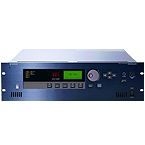
The DME system consists of the DME32 Digital Mixing Engine hardware, packed with Yamaha DSP power, and DME Manager, a graphical Windows program used to design entire audio systems in an intuitive "block diagram" style.
Completed designs are downloaded to the DME32, which then becomes that system, working as a standalone processor.
Components (i.e., system building blocks) include complete audio processors (e.g., mixers, compressors, effects, crossovers, etc.) and individual parts (e.g., faders, switches, pan pots, etc.), which can be used to build custom components.
The DME32 can hold two configurations, more can be stored on PC Card. Each configuration can store up to 99 scenes (i.e., snapshots of every parameter setting in the entire system).
Up to 32 inputs and outputs are available via four mini YGDAI slots. I/O cards allow a variety of analog and digital I/O configurations (AES/EBU, ADAT, Tascam).
Inputs, outputs (and processing power) can be expanded in multiples of 32 by cascad-ing up to four DME32s, for a maximum of 128 inputs and outputs.
Superb sonic performance is delivered by Yamaha's latest 32-bit DSPs and 48 kHz/24-bit I/O options.
Scenes and configurations can be recalled, and parameters controlled in real time via MIDI or custom made controllers hooked up to the GPI interface, which offers 16 inputs and outputs.
Applications for the DME32 are limitless, but include installations (e.g., house of worship, clubs, theaters, leisure centers, museums, showrooms), submixing, speaker cluster controllers, Matrix/routing, and multieffects processing.
ADAT is a registered trademark of Alesis Corporation. PCMCIA is a registered trademark of the Personal Computer Memory Card International Association. Tascam is a registered trademark of TEAC Corporation. Windows is a trademark of Microsoft Corporation. Yamaha is a trademark of Yamaha Corporation. All other trademarks are the property of their respective holders and are hereby acknowledged.
Version 1.5 of Yamaha's versatile DME32 Digital Mixing Engine offers new Matrix and EQ components, node numbering, parameter value copy and paste, improved parameter resolution, recall safe, and libraries for storing EQ, dynamics, and effects programs. In addition, DME Manager V1.5 supports more operating systems, including Windows NT 4.0, 2000, and Me. Naturally, DME32 V1.5 is fully compatible with legacy configurations.
Yamaha
Since 1887, when it began producing reed organs, the Yamaha Corporation in Japan (then Nippon Gakki Co., Ltd.) has grown to become the world's largest manufacturer of a full line of musical instruments, and a leading producer of audio/visual products, semiconductors and other computer related products, sporting goods, home appliances and furniture, specialty metals, machine tools, and industrial robots.
Yamaha now owns 59 subsidiaries and affiliates in overseas markets in addition to numerous related companies in Japan.
Additionally, Yamaha owns and runs its unique resort facilities throughout Japan so as to enhance our customers' leisure and cultural activities. Also, Yamaha provides a place for studying music, sets opportunities for presenting one's own compositions, and creates an environment for the enjoyment of a variety of musical endeavors.
Since Yamaha Music Foundation was established in 1966, it has generated a wide range of music activities throughout global society, including Yamaha music schools, and the Junior Original Concert. Strong commitment to promote and support music education and popularization is one of the most significant elements to distinguish Yamaha from its competitors.
Yamaha has endeavored to produce products and services that satisfy the diverse needs and desires of people worldwide. Its products and services are recognized the world over for superior quality in acoustics, design, technology, craftsmanship, and customer oriented services. These products and services under the brand name of Yamaha are highly regarded by a large number of professionals, institutions, business people within the related industries, and consumers.
Our corporate philosophies are embedded in our customer oriented management and operations; providing excellence in our products and services; continuous efforts to expand our existing market and create new markets; enhancement of research and development on a long range perspective; commitment to care for end users through providing even better service after sale; pursuit of further globalization of Yamaha's business; fostering positive growth through diversification.
Yamaha's very basic corporate objective is reflected in everything that it does, which is to contribute to the enrichment of the quality of lives for people around the world.
Used Audio Mixers
Audio mixers, or sound consoles, are electronic sound mixing boards used to combine two or more audio signals, before directing them to the output channels connected to the device.
Sound consoles do a great deal more than just combining different audio signals they allow users to optimize the sound output in a number of ways adjusting various sound levels, enhancing sound with special effects and equalization etc, allowing for unmatched control over the end product.
When there is a need for high quality sound control and output, audio mixers are an essential item for audio team. Mixing desks are used on stage in live concerts to combine the sound input from various musical instruments in to a stereo master mix. For TV and movie studios, sound consoles are essential to combine the various sounds from the numerous different microphones that will be used.
Audio mixers are available in a wide range of different shapes, sizes and designs, beginning with smaller units designed for portability, right up to the enormous sound consoles used in recording studios. The term audio mixer actually refers to any kind of sound mixing board, whereas a sound console is usually a device which sits permanently on a desk.
Technicians usually differentiate audio mixers according to how many channels they have. Fairly standard in the recording industry is the 12-channel mixer, in which you can hook up a total of 12 input sources. Sound consoles can also be more specified ‚?? for example, a 24 x 4 x 2 mixer has 24 inputs, 4 sub-group channels and 2 output channels.

